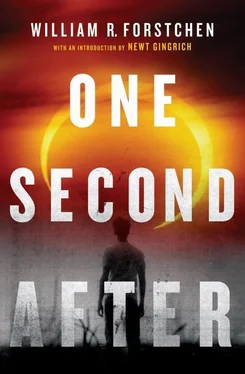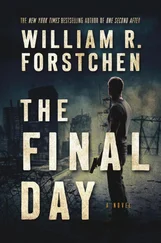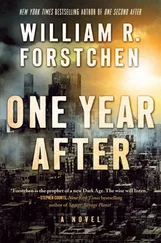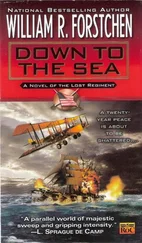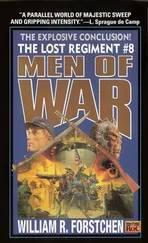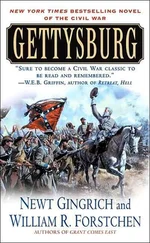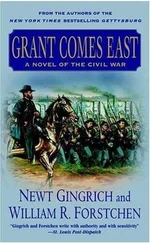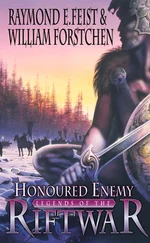It was towards evening and Makala came to sit by him.
“I’m worried about Elizabeth,” she said. “She needs to eat.”
“There’s nothing to eat,” John replied, “other than the rations at the college.”
“John, she’s in her third month. It’s crucial now, perhaps the most crucial month of all. The rations are mostly carbs. She needs protein, meat, as much as we can force into her.”
Makala fell silent, leaning against his shoulder, and he knew what she was saying.
It was not a hard decision at all now. Not hard at all. He went into the house and came out a minute later, carrying the .22 pistol. He handed Rabs to her.
Ginger was lying by Jennifer’s grave as if keeping watch. He knelt down and picked Ginger up. She was so light. “Come along,” he whispered. “You can still save a life, my dear friend. And besides… Jennifer wants to play with you again.”
How doth the city sit solitary, that was full of people? How is she become as a widow? She that was great among the nations, and princess among the provinces, how is she become tributary?
BOOK OF LAMENTATIONS 1:1
DAY 365
The phone ringing by his bedside woke him up, the light streaming through the window; it was just about dawn.
He could hear crying in the next room, little Ben, Elizabeth shushing him.
John picked up the phone. It was Judy and he listened, finally sitting up.
“I’ll be down there as quickly as possible.”
Makala was snuggled up by his side, half-awake.
“Come on, love; get up now.”
“What?”
She opened her eyes and looked around.
“Not even dawn yet.”
“Up. We got to get into town, all of us.”
He pulled on the old stiff trousers lying by the side of the bed and rubbed his chin, suddenly wondering if he should shave. Absurd, he had not shaved in more than six months.
It had been warm enough a week ago for all of them to have a bath. He had built a roaring fire, scooped water from the creek to heat, and then filled what had once been a small outdoor fishpond. By the time the girls and the baby had finished, the water was a dark scummy gray, but John didn’t care, the first at least tepid bath since late autumn.
The following day Makala and Jen had scrubbed clothes along the bank of the creek the old-fashioned way, a flat rock and an antique scrub board scrounged out of the basement. All had walked up to the college that evening for an actual spring dinner feast, 140 of the surviving students, Reverend Abel offering a service in the Chapel of the Prodigal, the choir putting on a musical performance, and then what was supposed to be a one-act comedy about someone finding a television that still worked… It had fallen rather flat, too painful, though the audience did laugh politely.
Ben had of course been passed from girl to girl, and for more than a few it was practice. The autumn and winter had resulted in more than a few pregnancies and rather quick marriages by Reverend Abel.
The dinner, of boiled corn mixed with apples, garnished with ramps and the first dandelions of spring, had at least been filling.
After the dinner, music, and play he had met with Abel, Malady, and the surviving faculty to talk about trying to get at least a few courses up and running… but the conversation had fallen away. It was time to struggle to bring in the first greens, to get hunting parties out, to maybe, just maybe, get the turbine project finished at the dam and finally hook electricity back up. Courses could wait until the fall.
He walked out into the living room, Elizabeth standing by the window, watching the sun rise, Ben nuzzled against her, nursing.
She did so look like her mother as she looked over her shoulder and smiled at him contentedly, that Madonna-like face all new mothers have when nursing a child.
“Morning, Daddy.”
“How is he this morning?
“Hungry little devil.”
“Get something on a little more presentable than that old bathrobe; you’re going into town with me now.”
“Why?”
“Just do it; wake up Jen and tell her to get moving as well.”
He walked outside; the air was chilled, the sky overhead clear. The trees were really leafing out now, though farther up the slope of the mountains it was still winter and Mitchell was still snowcapped.
Strange, a year ago today. Precisely a year ago.
He walked round the side of the house and saw a fresh tulip beginning to blossom. He snapped it off and placed it on Jennifer’s grave.
“Good morning, my little angel,” he whispered, and looked back to the window where Rabs sat gazing down protectively.
Next to her grave was another, smaller. Very little had been buried there, but he felt he owed Ginger that for her sacrifice. Elizabeth had found a faded ceramic dog and placed it there for Ginger shortly after Ben was born.
“Dad, what is it?”
Elizabeth was outside, holding Ben. “Just get in the car.”
The old Edsel, the miracle machine, was still running, though just barely, the rings going. He turned it over and it revved to life, black exhaust blowing out. Their remaining stock of gas was increasingly contaminated.
Jen came out, helped by Makala. The two had indeed bonded over the long winter; the starving winter it was now called by those who had survived it. Jen was failing. Though she stood proudly straight a year ago, osteoporosis was taking over. She was developing cataracts also but could still see well enough to at least read, which had become her source of comfort during the long cold winter months spent next to the fireplace.
The firewood. Though he argued against it, students made sure the house was supplied… and provided extra rations for Elizabeth as well.
Jen got into the back alongside Elizabeth, and Makala climbed into the front seat. He backed out and started towards town.
“What the hell is it?” Jen asked a bit peevishly. “Did someone get a bear?”
That had happened three weeks ago and had been the cause of an actual celebration in town. Bear stew, enough to feed a thousand when some of the precious dried corn and apples were mixed in.
A thousand, 960 actually, was the number now, at least as of yesterday afternoon.
The starving winter, as Kellor predicted, had taken down most of the rest of the survivors. The months of cold, increasing solitude as already weakened neighbors died away, fires going out, the weak far too weak to crawl out, bring in wood, and relight the flame… curling up and then just going to sleep. The death rate soared once more.
Just yesterday, at the town council meeting, Makala, now head of public health, had raised the terrible issue of burials. It had broken down by February. There were too many dead and too few left with the strength to bury them. It was estimated that hundreds of homes might now actually be morgues, the entire family dead. A hundred or more bodies were lying in the graveyard, decaying.
The decision was made to burn them, the grisly task to be seen to by those who would accept triple rations as payment.
That now was a horrible irony as well. With so many dying during the long winter, there was now actually enough food to see the rest through to summer.
John drove down Black Mountain Road, the road that had been his daily commute for so many years. There was no longer a guard at the gate, too few left to man it, along with the outposts and barricades. At the intersection to Flat Creek Road he had to take a turnoff. The ice storm of two months ago had dropped dozens of trees in the town, the next block still impassable; there was no one with the strength to clear the trees.
The First Battalion did still have strength, but he had kept them strictly to other tasks, to be the army, guarding the passes throughout the winter and guarding the food supplies. Their survival rate had been just about the highest. Black Mountain had lost close to eighty percent of its population in exactly one year, the college just over sixty percent, including the casualties from the war. Part of it was the resilience of kids in their late teens to early twenties, part of it the strict discipline, created by Washington Parker, continued now by Kevin Malady, and the slow, heroic sacrifice of President Hunt and his wife, who died from starvation, a month after the battle, so that “our kids” could have another meal.
Читать дальше
